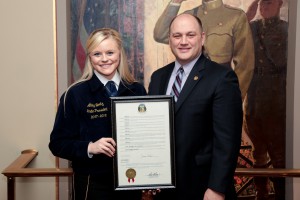As the legislative session continues, my fellow senators and I have been working diligently to get bills perfected, passed and sent over to the Missouri House of Representatives for discussion and debate. This week, the Missouri Senate perfected several legislative proposals, including Senate Bill 807. This bill increases the efficiency and accessibility of degree programs. The legislation aims to allow higher education institutions to offer degree programs they currently do not offer in conjunction with the University of Missouri System.
If passed, I believe this legislation will encourage more students to take advantage of the opportunity to receive a professional degree without the burden of having to move or transfer from their current institution. When families start considering colleges, most of the time, the cost of education is at the top of the list. Under this proposal, students can stay close to home and still work to attain the degree of their choice.
Senate Bill 775 was also perfected. This bill continues Missouri’s Federal Reimbursement Allowance program for hospitals across the state through 2020. Hospitals rely on the funds allocated through this program to help cover the costs for indigent patients who are unable to pay their bill. This helps stabilize the overall treatment costs for patients who may have insurance or pay out of pocket. With ballooning healthcare and insurance costs, hospitals in rural areas especially need the additional support of these funds in order to adequately treat patients within their communities.
In addition, The Missouri Senate also perfected Senate Bill 586, which creates a Joint Committee on Disaster Preparedness. In the case of a natural or man-made disaster, a 13-member committee would be tasked with having a plan in place to address issues associated with a disaster. Studies have shown there is a possibility of a 6.0 seismic earthquake to occur in Missouri within the next 50 years because of its location along the New Madrid Fault Line. In light of the floods that occurred in 2017 causing damage across our state as well as in District 21, I believe it is not only important to have a plan in place, but it is vital to have the means and resources to react and record these events for future reference.
This week, Senate Bill 767, known as the Missouri Video Lottery Control Act, was voted out of the Veterans and Military Affairs Committee and we anticipate this proposal being sent to the Missouri Senate to be discussed and debated before the full Senate. Under this proposal, Missouri’s colleges and universities and our state’s veterans would benefit from video lottery terminals (VLT) being placed into local businesses, where up to five video lottery terminals would be managed by operators licensed through the Missouri Lottery. Up to 10 terminals can also be placed in fraternal or veterans organizations. As a VLT retail site, fraternal and veterans organizations will receive 32 percent of the revenue generated by the terminals, while also reaping approximately $4 million in additional funds gained from the licensing renewal fees starting in 2020.
In addition to discussing and debating legislation on the floor of the Missouri Senate, I had the opportunity to meet with numerous advocacy groups who visited the capitol this week. The groups included representatives from the Missouri Recovery Network, the Heartland Credit Union Association, students from the Future Farmers of America and others. Each group represented various issues and industries that encourage innovation and business across the state of Missouri. Their presence enhances my ability to discuss and debate legislation on their behalf.

Groups like FFA provide valuable leadership opportunities to our youth. FFA plays a vital role in promoting Missouri’s number one industry, agriculture. By engaging students in the legislative process early on, FFA is exposing them to the importance of advocacy and being involved in the legislative process. Policies surrounding issues like agriculture can affect the livelihood of many farmers across the state.
As legislators, we learn more about the issues that are important to constituents when they communicate with us. Visiting the capitol and meeting with your senator or representative is just one way to get involved in the legislative process. It was a pleasure to meet with all of these individuals and I encourage others to contact my office at any time to schedule a visit. As always, I appreciate hearing your comments, opinions and concerns. Please feel free to contact me in Jefferson City at (573) 751-4302. You may also email me at denny.hoskins@senate.mo.gov.

